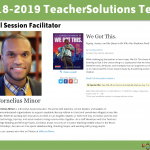This article is a reflection on my experiences with my students with unique needs.
“When he comes into your class, he may have a hard time adjusting. He has…
…a learning disability
…a speech impairment
…occupational and executive functioning delays
….a diagnosis of ADHD
…transition issues
So please know that he may be a challenge. Here is his current IEP (or 504 or past teacher log) with a list of accommodations that we found helpful. Let us know how we can help.”
This is what I heard about quite a few of my students as they entered into my multigrade class as a first-grade student. My response is about the same for all. “The child is now entering into a new environment. What he needed last year he may not need this year. His biggest work this year is to start gaining awareness of his unique learning needs, start developing the skills of an academic student, and learning how to partner with us regarding his education. Plus, he is only six years old. Let’s give him a month or so to adjust, then we will review his plan and adjust accordingly.”
Then, we (student and I) begin the work. I begin teaching lessons, holding him accountable, and adjusting the environment as needed to support his needs. He begins learning that he has a role to play in his education, he is expected to “show up”, he has the freedom to make choices regarding his learning needs, he can modify his environment, he is a part of a larger community with mutual responsibilities, and he belongs in it. He is not sent to the office as a consequence for negative behaviors. Yet, he is expected to not disrupt the learning environment of others.
This is hard work for a first grader. Pretty quickly he learns that he can go outside when he decides he needs a break (and break does not equal running through the courtyard doing flips if it disrupts the learning of other classes…freedom goes with responsibility). When he needs a snack or restroom break, he should take one because he is better able to focus afterward. He learns that when he decides to go, he does not inform me in order to gain permission, but so that I know where he is in case of emergency.
He learns that creating a daily work plan and using a timer can help keep him focused. There is a difference between doing work that’s “easy” vs. doing work on his ability level, and he is expected to do the latter. He learns that speaking in complete sentences has a positive impact on his writing skills. His friends do not think it’s funny when he keeps disrupting their work. His friends do think it’s funny when he tells a well-timed joke. A sincere apology mends wounds quickly. He can be at peace with his enemies when they respect each other’s boundaries. He learns that we definitely stop working so we can go outside to observe the dragonflies that are hovering outside our classroom door (when will that ever happen again?) and in a class of 36, there is always a friend nearby. He learns that work has to be balanced with play, and there is a time and place for both. I pray above everything, he learns that he belongs with us…his community and peers.
Over time and years, his conversations with his SPED teachers, parents, and me include more of his preferences and input. He is able to determine that he is spending too much time out of class in support services (ie, intervention, reading intervention, support groups) because he learns better when he gets the original lesson with his peers. He learns he needs help with some skills but is better than his peers in others. He expects specialized supports to be impactful or else, why bother? As a third grader, he is a role model to his peers. He holds them to high expectations and lets them know that they need to learn how to “Get in where you fit in”. He realizes standardized testing is not his strong point, but he is great at explaining processes and demonstrating with models.
As the days turn into years we all look at this child with love, admiration, and awe. We are hopeful for his future. He will have to work hard in some areas, but we know what they are and how to support them. He has way more strengths than needs. As we reflect over the years, we realize that what we first saw as disabilities were really different abilities. This is hard work and he needs soft spots along the way, so we are glad that we differentiated where necessary while maintaining high expectations based on his ability levels. We all agree that he is ready to enter Upper Elementary. Yep. I think this kid is going to do great. Next.








